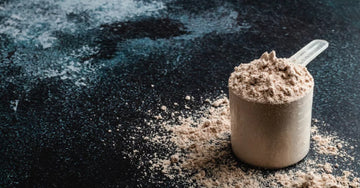In the world of fitness and nutrition, supplements play a significant role in helping individuals achieve their health and fitness goals. Two popular supplements that often find their way into the regimen of fitness enthusiasts are creatine and protein powder. While both are widely used to enhance performance and support muscle growth, it's crucial to understand that they serve distinct purposes and are not interchangeable.
In this blog post, we'll delve into the characteristics of creatine and protein powder, exploring the unique benefits each offers and how they complement different aspects of a well-rounded fitness routine.
Creatine: Powerhouse Molecule
Creatine is a naturally occurring compound found in small amounts in certain foods and produced by the body. It plays a pivotal role in the production of adenosine triphosphate (ATP), the primary energy currency of cells. Creatine supplementation has been extensively studied and is known for its ability to enhance high-intensity, short-duration activities like weightlifting and sprinting.
Benefits of Creatine
Improved Strength and Power: Creatine helps increase phosphocreatine stores in muscles, contributing to the rapid production of ATP during short bursts of intense physical activity, resulting in enhanced strength and power.
Enhanced Muscle Recovery: Research suggests that creatine supplementation may reduce muscle cell damage and inflammation, promoting faster recovery after intense exercise.
Cognitive Benefits: Beyond its physical benefits, creatine has shown potential cognitive benefits, such as improved memory and mental fatigue resistance.
Protein Powder: Building Blocks of Muscles
Protein is an essential macronutrient crucial for muscle repair, growth, and overall body function. While it can be obtained from whole foods, many individuals turn to protein powder as a convenient and efficient way to meet their protein needs, especially in the context of a busy lifestyle or specific dietary requirements.
Benefits of Protein Powder
Muscle Building and Repair: Protein is composed of amino acids, the building blocks of muscles. Consuming an adequate amount of protein supports muscle protein synthesis, aiding in muscle repair and growth.
Convenient Nutrient Source: Protein powders offer a quick and easy way to increase protein intake without the need for extensive meal preparation, making them suitable for busy individuals or those with specific dietary restrictions.
Weight Management: Protein is known to promote satiety and can aid in weight management by helping individuals feel fuller for longer periods, reducing overall calorie intake.
Differences and Complementary Roles
While both creatine and protein powder contribute to muscle health and athletic performance, they serve different purposes. Creatine primarily enhances energy production during high-intensity activities, while protein powder focuses on providing the necessary amino acids for muscle repair and growth.
Conclusion
In the debate of creatine vs. protein powder, there is no winner or loser – rather, there is a synergistic relationship between the two. Integrating both supplements into a well-balanced fitness routine can maximize the benefits, supporting not only enhanced performance but also optimal muscle health. As with any supplement, it's essential to consult with a healthcare professional or a registered dietitian before incorporating them into your regimen, ensuring they align with your individual needs and goals. Remember, there is no one-size-fits-all approach to nutrition and supplementation, and a personalized strategy is key to achieving long-term success in your fitness journey.




